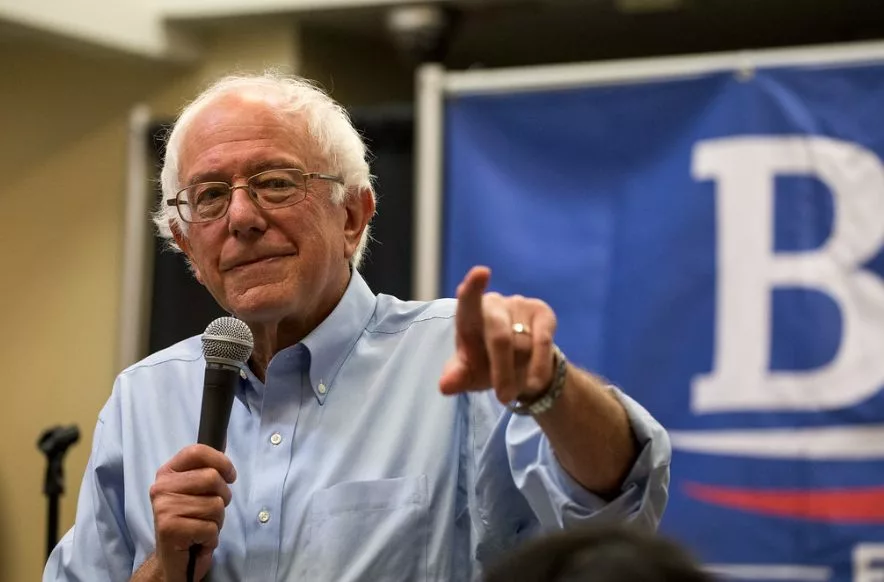Why we do, but shouldn’t, call politicians by their first names.
References to politicians by their first names always occurred in conversations at the pub or debates at an ‘afters’ I was a part of. Yet, when I first began to rethink this habit, I was sat two metres of away from one of its key perpetrators. Hearing Senator Bernie Sanders speak in the hallowed chamber of the Oxford Union in Hilary 2022, his croaky voice bouncing off the equally deteriorating walls, as he reached for his scrunched-up tissue used to stifle a runny nose, made be believe I might really know this man on a first name basis. His passionate oratory moved me, and many others that day; I left with a profound sense that I really ‘got’ him, I knew him, he was Bernie.
Connections between the political class and the electorate is an essential method in compelling voters to tune in to the decisions that manifestly affect their daily lives. Therefore, inviting the populace to ‘know’ their politicians on a first-name basis is an effective strategy in securing this association.
We see these para-social relationships form all the time. A banner strewn across Stamford Bridge reads ‘Chelsea: our religion’, while some members of the ‘Beyhive’ actually do believe that Beyonce is their ‘bestie’. People crave to feel connected to something bigger or more important than them; it is probably one of the only things that football hooligans and avid listeners of ‘Single Ladies’ share!
I left the Union, with a few similarly inspired pals of mine, and ventured to Gloucester Green, to get a slightly-above-average noodle dish, as the awe of the occasion wore off a little. I began to re-evaluate my insistence I knew the Senator, more than ever before, by his first name. I thought about which other famous figures I might also know by their first name: Adele, Drake (although his first name, Aubrey, has been sneakily forgotten, much like the next name on this list), and, of course, Boris.
Suddenly, I was not so keen on the idea that I might call some of these powerful, influential, and charismatic figures by their first name. We call our friends by their first names because we share memories with them, we know their greatest secrets and, because we usually don’t share a football pitch with them, where there might be a slightly greater tendency to call them by their surname and add the ‘-o’ suffix at the end. (As a side note, I’m still waiting on the day someone shouts ‘Robbo’ at me to pass them the ball – the world will be better place once this happens.)
When we call our friends, peers, or acquaintances by their first name, there is a recognition there that we actually ‘know’ that person and therefore might be able to give them more sympathy during a tricky period or support them when they make mistakes.
We behave differently with politicians. Our political system requires us to hold them to account in a way we wouldn’t our friends. In a functioning democracy politicians are challenged, so they truly serve their communities and are held responsible for the decisions they make.
We might do this more easily if we rejected this familiar attachment we have to these figures. As I have tried to re-wire my brain to know ‘Bernie’ as Senator Sanders or ‘Boris’ as Boris Johnson, I am less forgiving.
For Senator Sanders, I found his answer to the issue of climate change at the Oxford Union followed a similar pattern to many of the older generation: a slightly patronising and wilfully unsophisticated claim along the lines of ‘Oh, you young people are smart, you will figure it out’.
For Boris Johnson, his once shiny veneer as a bumbling, affable, ‘doofus’, which albeit has already deteriorated significantly, looks even more like a rusty façade, hiding a calculated, performatively incompetent, political opportunist.
Now, I’m not suggesting we all start calling Drake ‘Aubrey Graham’ from this moment on, but I think it is important to apply a cynicism to the famous folk, particularly with political power, who push the idea that we should all know them by their first name.
For the majority of these first-named politicians, it is an explicit campaign tactic. In the case of ‘Hillary’, or more appropriately Hillary Clinton, using her first name was “actively encouraged” by her campaign.
Similarly, in the self-proclaimed “hilarious election advert” posted by the Conservatives’ YouTube channel in 2019, Mr Johnson is referred to by the interviewer as ‘Boris’ within the first four seconds.
As a result, it is our critical judgement that falls victim, because we supposedly know these powerful political figures in a different way – they become more of a friendly face, and therefore we apply a different, more attainable standard by which we evaluate them.
In fact, as I thought to the times I have fallen for this political ploy, I remembered that I even own a T-shirt from Senator Sanders’ 2016 campaign embossed with ‘Tío [Uncle] Bernie’ on the front, when I know, or at least the last time I checked, the 82-year-old Brooklyn-born politician is definitely not my uncle. (If he is, that’s a lot of Christmases in which I have missed the opportunity to convince him into wearing a Santa costume.)
Ultimately, we must try to resist the temptation, and call politicians by their full names, to help ensure they remain responsible for the immense power they hold and what they choose to do with it.


